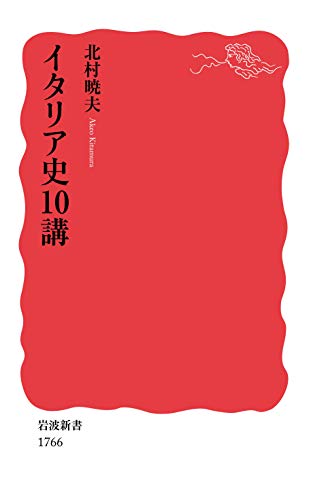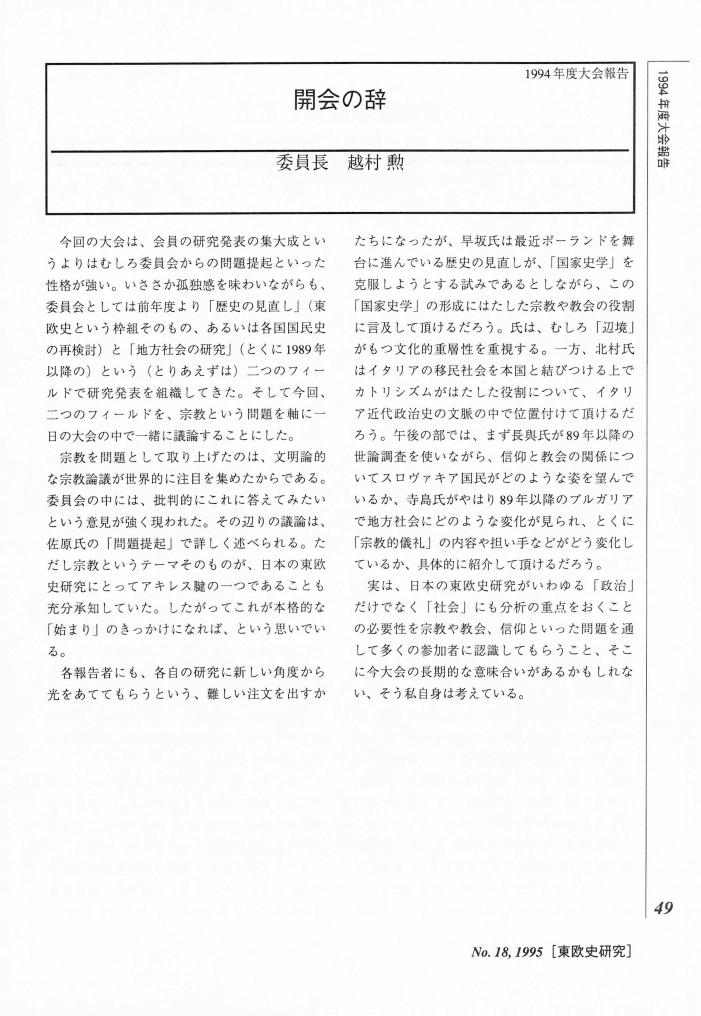10 0 0 0 OA 南米のイタリア移民 : ブラジルとアルゼンチンを中心に
- 著者
- 北村 暁夫 キタムラ アケオ Akeo Kitamura
- 雑誌
- 立教大学ラテン・アメリカ研究所報
- 巻号頁・発行日
- vol.46, pp.1-13, 2017
- 著者
- 北村 暁夫
- 出版者
- 公益財団法人 史学会
- 雑誌
- 史学雑誌 (ISSN:00182478)
- 巻号頁・発行日
- vol.98, no.9, pp.1575-1576, 1989-09-20 (Released:2017-11-29)
- 著者
- 北村 暁夫
- 出版者
- 日本農業史学会
- 雑誌
- 農業史研究 (ISSN:13475614)
- 巻号頁・発行日
- vol.43, pp.3-13, 2009 (Released:2017-03-23)
This article focuses on the following two issues: first, to illuminate the emigration practices in the Italian plain areas from the late nineteenth century to the Fascist Era: second, to analyze the political and economic life of 'the emigrant-exiles', that is, the peasants and artisans who moved from Italy to France during the Fascist Era, both for the economic reason and for the political one. This article makes the case study for these issues, taking an example from Calcinaia, a Tuscan village in the Pisa plains, which sent many 'emigrant-exiles' to Southern France, particularly to the Arles region. Calcinaia is a village along the Arno River, which had the population of about 4,000 in the late nineteenth century. The majority of the inhabitants were agricultural laborers and their families. They very often moved from one village to another, and chose their spouse from another village. Thus their migration and marriage practices were very different from those in the mountainous areas, where people chose their spouse in the same village. Also, the emigration practices were very different. As soon as the emigration to Southern France began in the 1880s, the number of emigrants increased rapidly and they often emigrated with all the family members. The profile of the emigrant-exiles of Calcinaia can be found in 'Casellario Politico Centrale', archives of the Italian Ministry of the Interior. Among ninety-eight persons of Calcinaia recorded in these archives, sixty-nine moved to France during the Fascist Era. They were all men, relatively young and the majority of whom were agricultural laborers. Their livelihood in France depended on immigrant communities composed by their countrymen. During their stay in France, some continued to lead local antifascist movements, but others ceased to be involved in any political activities, and came back to Calcinaia to pass the 'tranquil life' in their home town. The Fascist government permitted them to return to Italy in order to obtain the cooperation to the regime from them. This article may conclude that it was a clear antifascist manifestation for 'the emigrant-exiles' to continue to stay in France and to refuse to return to Italy, since their home-coming only meant cooperation to the Fascist regime.
本研究はイタリアの自由主義期を対象として、議会選挙やさまざまな立法活動などの際に見られる国家と地域社会との交渉や妥協の歴史的過程を具体的に分析することにより、イタリアの「国民国家」形成の特質を明らかにすることを目的としている。本研究は共同研究であり、研究代表者、研究分担者7名、研究協力者6名の合計14名の参加者から構成され、2年の研究期間に合計6回に及ぶ研究会(研究打ち合わせ1回、研究合宿4回、他の研究会(イタリア近現代史研究会)の年次大会とのジョイント1回)を行った。この間に史料や研究文献のリスト作成や年表の作成なども行い、こうした一連の作業の成果を大部に報告書に集約した。この二年間の研究成果として以下のことが明らかになった。(1)近年の研究では1880年代後半から1890年代半ばにかけてのクリスピ時代に統治機構の大規模な改革が行われたことに注目が集まっていたが、それに先立つデプレーティス時代に国民形成に向けてのある種の構造転換が起きていた。(2)議会が多様な地域利害が議論・調整される場として、エリート層のナショナルな統合を推進する役割を果たしていた。(3)南部問題は、「国民国家」形成にとって重要なモーメントの一つであった。(4)カトリック教会やカトリシズムは従来想定されていた以上に、ナショナルな統合に大きな役割を果たしていた。(5)多様な地域的利害を交渉・調整していくうえで、ローカル・エリートが果たした役割の重要性が明らかになった。以上の成果を踏まえたうえで、今後は本研究の方法を深化させるために、特定の地域社会やローカル・エリートを対象とした中央一地方関係の事例研究を推進していく必要性を確認した。
1 0 0 0 OA 1994年度東欧史研究会大会報告
1 0 0 0 OA 南イタリア・カラーブリア州における移民と農業 : いわゆる「大流出」の時期を中心に
- 著者
- 北村 暁夫
- 出版者
- 社会経済史学会
- 雑誌
- 社会経済史学 (ISSN:00380113)
- 巻号頁・発行日
- vol.59, no.2, pp.291-319,343, 1993-07-25 (Released:2017-07-01)
From the 1870s to the beginning of the First World War, numerous emigrants left Calabria, southern Italy, for the American countries. A large number of them were young single men who had worked in the agrarian sector in Italy. This article examinens the causes of the peasant emigration and its effects on rural areas in Calabria, using emigration statistics and contemporary surveys of agrarian inquiries. The emigration began in the northern part of the mountains of Calabria. Tha peasants of these areas traditionally participated in a subsistence economy supplemented by domestic industry and seasonal employment, especially in the plains, where the cereal latifondo was under cultivation. But when the decline in domestic industry and the consequent decrease in employment opportunities was accelerated by the agrarian crisis of the 1880s, many peasants were compelled to emigrate abroad as an alternative to traditional employment. Most emigrants eventually returned home and purchased a piece of lands. This disproves the contention that the emigration led to a general proletarialization of the peasants. While returnees with a lot of savings were able to become independent farmers, those who had not saved enough were forced to emigrate again, often permanently. In this way, the emigration charged the traditional subsistence economy and polarized the peasant structure of the area.
1 0 0 0 OA 藤澤房俊著『赤シャツの英雄ガリバルディ』, 洋泉社, 一九八七・九刊, 四六, 二七〇頁
- 著者
- 北村 暁夫
- 出版者
- 公益財団法人 史学会
- 雑誌
- 史学雑誌 (ISSN:00182478)
- 巻号頁・発行日
- vol.97, no.10, pp.1758-1759, 1988-10-20 (Released:2017-11-29)
1 0 0 0 [報告]ニューオーリンズのシチリア移民
- 著者
- 北村 暁夫
- 出版者
- 公益財団法人 史学会
- 雑誌
- 史学雑誌 (ISSN:00182478)
- 巻号頁・発行日
- vol.110, no.8, pp.1565-1572, 2001
- 著者
- 北村 暁夫
- 出版者
- 公益財団法人史学会
- 雑誌
- 史學雜誌 (ISSN:00182478)
- 巻号頁・発行日
- vol.97, no.10, pp.1758-1759, 1988-10-20
本研究は、ヨーロッパ史上に出現した諸団体の多くに通底してみられる宗教的・密儀的な性格の比較分析をとおして、長期的時間の視野のもとに、古代から現代にいたる団体・結社の組織原理および思想潮流の展開過程と系譜関係を解明することを目的として組織された。18世紀に急発展をとげるフリーメイソン団を比較分析の十字路としつつ、古代ギリシア、中世ドイツ・ネーデルラント、近世フランス・イギリス、近代チェコ・アイルランド、現代イタリア史の専門家を結集し、合計6回の研究会を組織して、研究報告と討論を積みかさねた。本研究の独自性は、まず第一に、従来の歴史研究では各々の団体の性格に応じて、宗教史・経済史・政治史などの分野で別個に研究したのに対して、機能を異にする諸団体間の連関・重複・継承関係を重視したこと、第二に、伝統的歴史学の重視する団体の制度的・機能的側面よりも、団体内部の友愛・連帯を支える儀礼的・象徴的側面を強調したこと、第三に、これらの儀礼や象徴に素材を与えた密儀・秘教思想を、従来のように哲学的・思想史的観点のみならず、歴史的・社会的視点からも研究しようとしたことにある。もちろん研究成果には対象により粗密の差があり、全体の整合的連関にも課題を残しており、すべての問題に解答できたわけではないが、今回の成果をもとにさらに共同研究を深めれば、ヨーロッパ文明の根底にある非合理的・神秘的世界観、およびその容器となった兄弟団・友愛結社の役割の解明をつうじて、現代世界の批判的理解と実践的な未来構想の一助となる歴史理解を構築することができると信じている。
- 著者
- 北村 暁夫
- 出版者
- 公益財団法人史学会
- 雑誌
- 史學雜誌 (ISSN:00182478)
- 巻号頁・発行日
- vol.116, no.1, 2007-01-20



